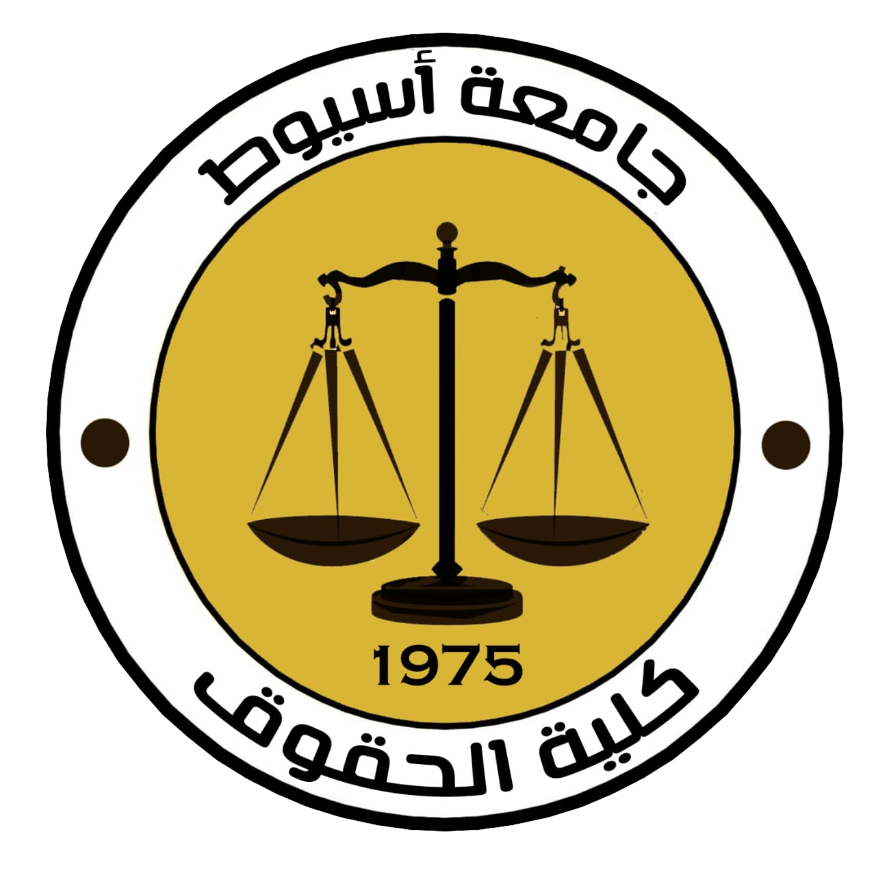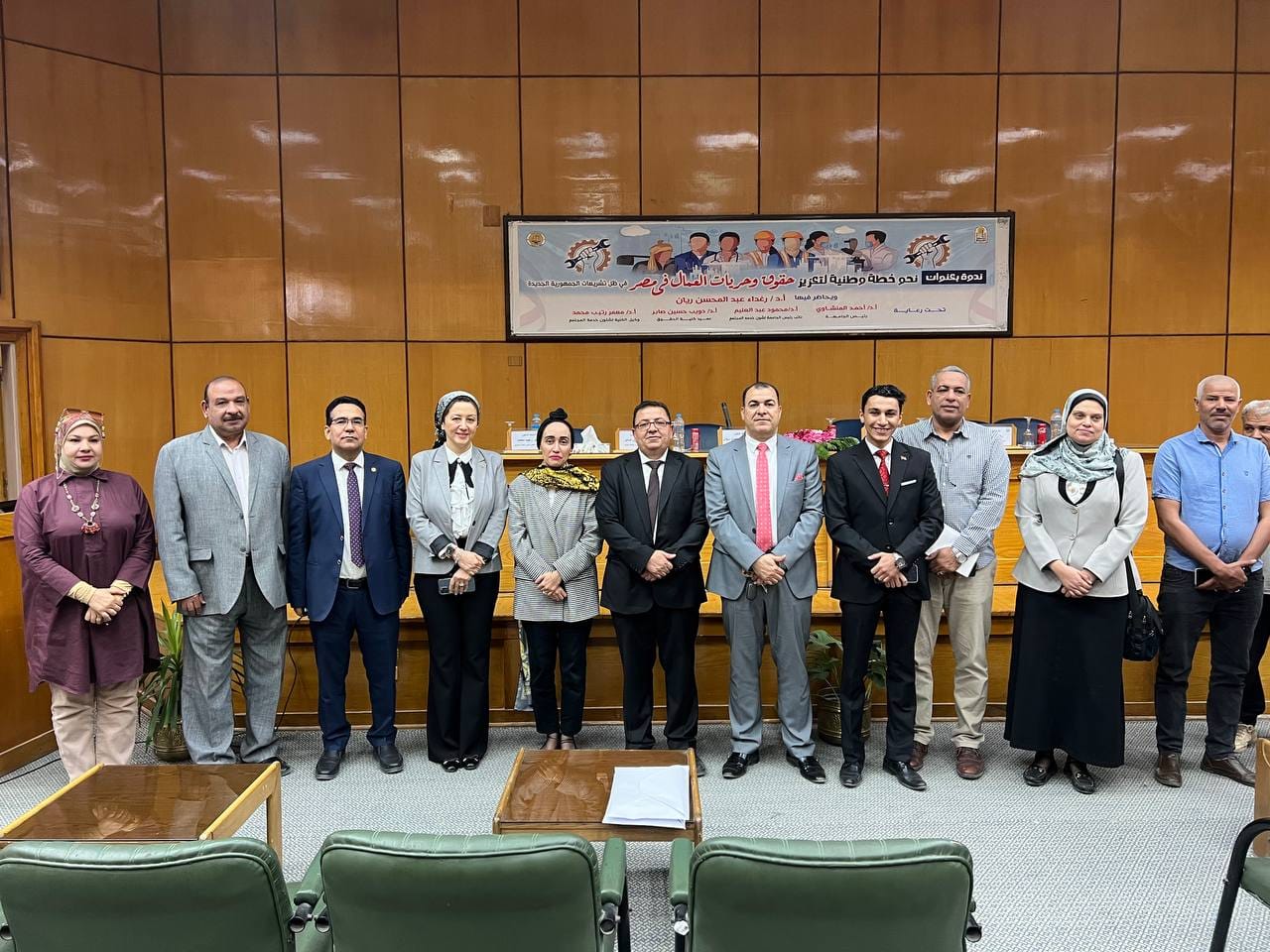Faculty Of Law Assiut University كلية الحقوق جامعة أسيوط
A seminar at Assiut University on "Towards a National Plan to Promote Workers' Rights and Freedoms in Egypt" at the Faculty of Law
Dr. Al-Minshawy: The seminar recommends establishing a legal regulation for non-traditional work patterns
Under the auspices of Dr. Ahmed Al-Minshawy, President of Assiut University, the Faculty of Law at Assiut University organized a seminar entitled "Towards a National Plan to Promote Workers' Rights and Freedoms in Egypt" in light of the legislation of the new republic; Today, Wednesday, May 8, under the supervision of Dr. Douib Hussein Saber, Dean of the Faculty of Law and Legal Advisor to the President of the University, and Dr. Raghda Abdel Mohsen Rayan, a faculty member in the Department of Labor and Social Legislation at the Faculty, lectured.
The symposium was attended by Dr. Mahmoud Abdel-Alim, Vice President for Community Service and Environmental Development, Dr. Duaib Hussein Saber, Dean of the Faculty of Law and Legal Advisor to the President of the University, Dr. Ragab Al-Kahlawi, Vice Dean for Education and Student Affairs, Dr. Moamer Rateb, Vice Dean for Community Service and Environmental Development, and Dr. Mustafa Sanusi, from the Public Law Department at the Faculty, as coordinator and presenter of the symposium, with the participation of the University President’s advisors, the University Secretary-General, assistant secretaries, directors of the administrative apparatus, university employees, a number of workers in the Labor Union, and a crowd of students and graduates.
Dr. Ahmed El-Minshawy, President of Assiut University, pointed out that the symposium comes within the framework of the university's continuation of its educational and awareness-raising role, and organizing a number of meetings aimed at spreading awareness, the culture of rights and duties, establishing the value of work, and enhancing the role of workers in Egypt, as they are the builders of this country and soldiers of development, and one of the important pillars that cannot be dispensed with, pointing out the necessity of building a decent work environment, and providing care and protection for all workers in accordance with national legislation and international labor standards, which benefits the national economy and achieves the goals of sustainable development in light of the legislation of the new republic, the national strategy and Egypt's vision 2030.
Dr. El-Minshawy explained that the symposium recommended establishing a legal regulation for non-traditional work patterns (remote work - work via electronic platforms - part-time work) at the heart of the labor law in light of the relevant international and Arab labor standards, and the commitment to informing the worker in advance by any technical means that would evaluate him professionally and recognizing the right of the worker who works according to electronic work systems to disconnect electronic communication outside working hours to preserve his right to rest.
For his part, Dr. Mahmoud Abdel-Alim pointed out that the Egyptian worker is the nation's true wealth, the engine of development, and the starting point for a better reality and future, through strengthening the national economy, development and production, stressing the university administration's keenness to pay attention to the administrative apparatus, prepare cadres, and enrich the experiences of workers to acquire knowledge and new skills in the work environment, develop innovation, communication and interaction skills, motivate workers and invest their capabilities, and benefit all parties of society and its development, to achieve the goals of sustainable development.
Dr. Duaib Hussein pointed out that the symposium coincides with the celebration of Labor Day, and the Egyptian state's interest in workers and the labor market to achieve development and prosperity, and the application of modern systems in line with different work patterns, the development of its laws, and the achievement of progress in building the new republic, adding that the symposium revealed a number of results, the most important of which are: that there is no ideal minimum wage that can be generalized to countries, but rather it is due in this regard to the circumstances of each country individually after consultations with social workers and in light of the desired national goals, and the minimum wage can play the role assigned to achieve social justice, when it is designed in a way that ensures meeting the needs of workers and their families. During her lecture, Dr. Raghda Abdel Mohsen reviewed: "A national plan to enhance workers' rights and freedoms in Egypt under the legislation of the new republic", pointing out the meaning of the term (worker) in Labor Law No. 12 of 2003, the right to receive a fair wage not less than the minimum wage, the worker's right to professional equality and non-discrimination, the worker's right to privacy, occupational health and safety (decent working conditions), the right to vocational training, and job stability, pointing out the repercussions of technological transformation, climate change, and global economic crises on the Egyptian labor market, and the emergence of different patterns of work (remote work, work via electronic platforms, part-time work). The symposium also revealed several important results, including that there is no ideal minimum wage that can be generalized to countries, but rather it is up to the circumstances of each country individually, which are decided after consulting with social partners and in light of the desired national goals. The minimum wage can also play the role assigned to achieving social justice, when it is designed in a way that ensures that it meets the needs of workers and their families. In addition to recognizing the employer's right to use modern technologies to monitor the activities of his workers, it cannot be a way to attack the worker's private life.
The symposium presented several important recommendations, including establishing a legal regulation for non-traditional work patterns and remote work, and committing to informing the worker in advance by any technical means that would evaluate him professionally, in addition to recognizing the right of the worker who works according to electronic work systems to disconnect electronic communication outside of working hours to protect his right to rest.
Prof. Dr. Douib Hussein Saber concluded the symposium by emphasizing the pioneering role of the Faculty of Law in spreading awareness, developing youth, and supporting Egypt's Vision 2030, heralding many, many major upcoming events.











